Marqués to Join Canedy at Simon & Schuster
Homepage photo: Auge Internacional Media
Support Journal-isms
Marqués to Join Canedy at Simon & Schuster
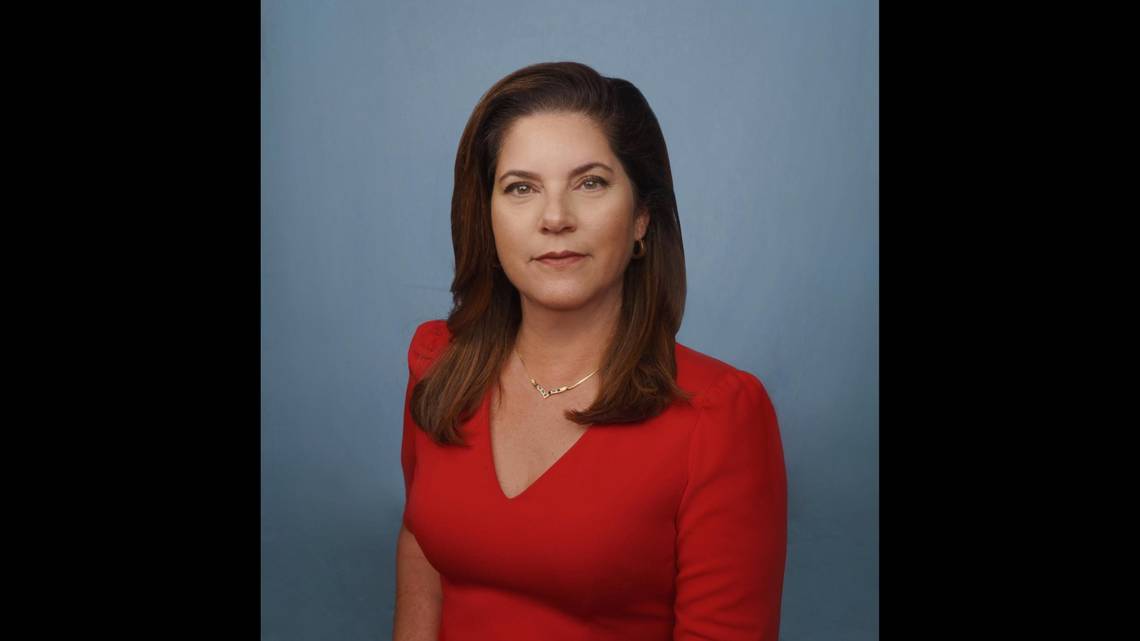 The announcement comes after Marqués (pictured) and the Herald weathered an uproar over distribution of what the company called “deeply offensive and racist content” in Libre, an independently produced weekly newspaper focused on Cuban exiles that for about eight months had been inserted each Friday into El Nuevo Herald.
The announcement comes after Marqués (pictured) and the Herald weathered an uproar over distribution of what the company called “deeply offensive and racist content” in Libre, an independently produced weekly newspaper focused on Cuban exiles that for about eight months had been inserted each Friday into El Nuevo Herald.
Nancy San Martin, managing editor of El Nuevo Herald, resigned from the newspaper last month and Marqués, executive editor of the Herald, lost her additional position as president.
Before that, the National Association of Black Journalists and others complained about “An observed continued pattern of racially insensitive remarks/tweets by sportswriter Armando Salguero” and demanded a meeting, which took place.
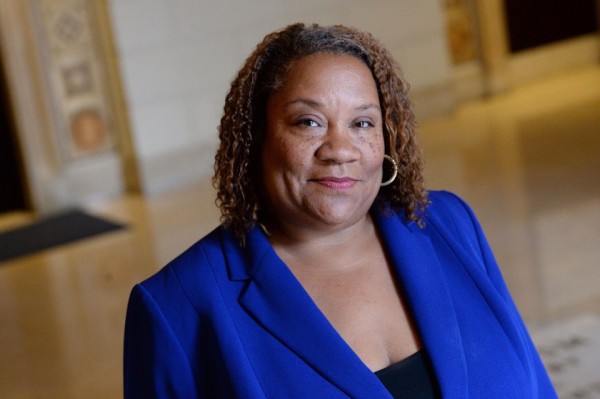 In July, Simon & Schuster named Dana Canedy (pictured), formerly of The New York Times and administrator of the Pulitzer Prizes, as executive vice president and publisher, one of the biggest jobs in book publishing. Canedy became the first Black person to hold the position. Hiring Marqués is sure to help Canedy in her quest for diversity there and elsewhere in the industry.
In July, Simon & Schuster named Dana Canedy (pictured), formerly of The New York Times and administrator of the Pulitzer Prizes, as executive vice president and publisher, one of the biggest jobs in book publishing. Canedy became the first Black person to hold the position. Hiring Marqués is sure to help Canedy in her quest for diversity there and elsewhere in the industry.
Canedy messaged Journal-isms, “I approached Mindy soon after I arrived as publisher at Simon and Schuster and she is my first hire. I am thrilled about all she will bring to the role.”
Despite the recent uproars, “In her decade as the Herald’s top news executive, the newsroom has won multiple honors for its reporting, including two Pulitzer Prizes and an array of other awards for investigative work on topics ranging from the abuse of children and juveniles to illegal gold mining in Latin [America] and the sweetheart plea deal of sex abuser Jeffrey Epstein,” the Herald said Thursday.
Marques and investigative reporter Julie K. Brown are credited with forcing the story of Epstein, a financier charged with trafficking underage victims for sex, onto the national agenda in 2018. Epstein killed himself in his jail cell.
“In a letter to the staff, which has been working remotely since mid-March due to the COVID-19 pandemic, Marqués thanked them for their ‘fierce dedication to our audience’ and called her years at the Herald ‘the pinnacle of my career.’ “
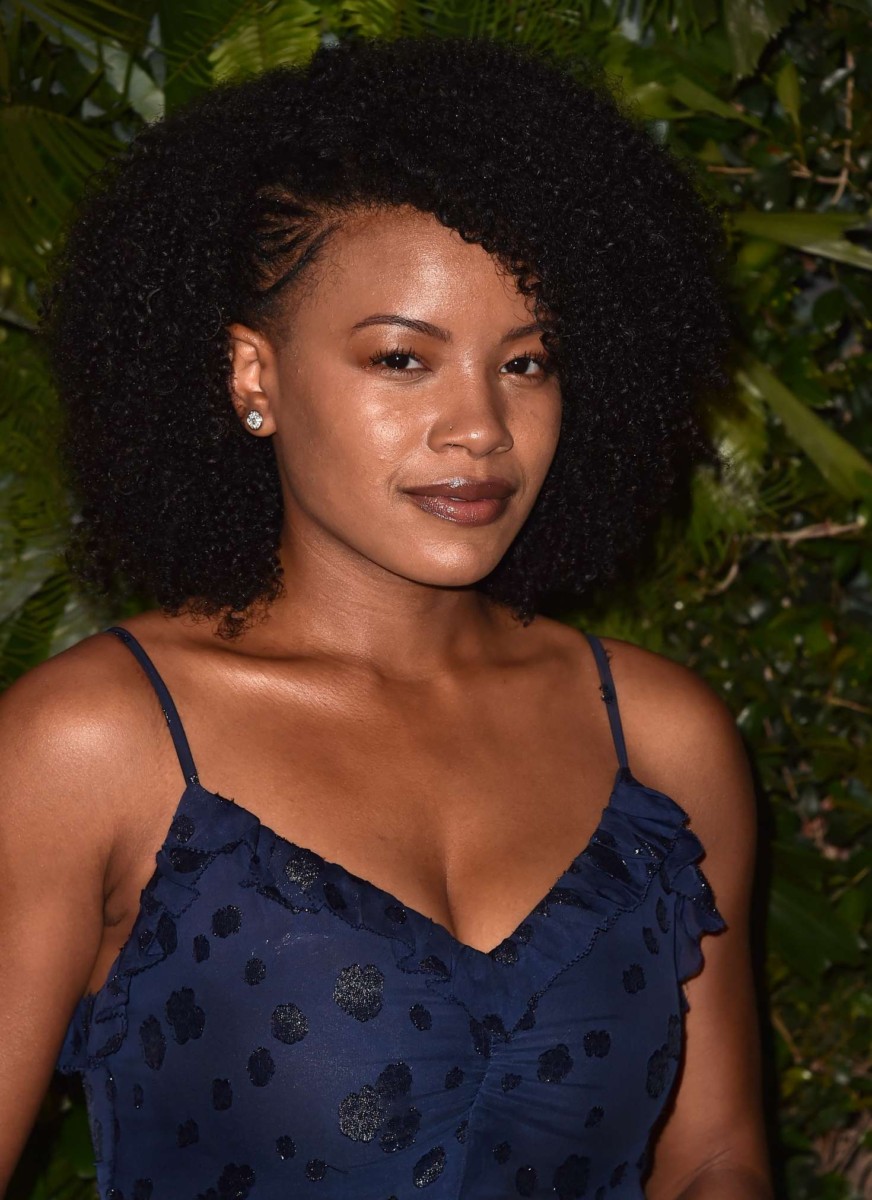 Separately, Justin Kroll wrote Friday for Deadline that “Following a lengthy search, Roxanne, Roxanne star Chante Adams (pictured) has landed the female lead opposite Michael B. Jordan in Sony’s A Journal For Jordan, directed by Denzel Washington. Written by Academy Award nominee Virgil Williams, the film is based on Dana Canedy’s best-selling memoir, which was published in 2008.” Adams is to play Canedy. The author was at the Times when she wrote the memoir about her fiance, First Sgt. Charles M. King, who died in Iraq, and their son, Jordan.
Separately, Justin Kroll wrote Friday for Deadline that “Following a lengthy search, Roxanne, Roxanne star Chante Adams (pictured) has landed the female lead opposite Michael B. Jordan in Sony’s A Journal For Jordan, directed by Denzel Washington. Written by Academy Award nominee Virgil Williams, the film is based on Dana Canedy’s best-selling memoir, which was published in 2008.” Adams is to play Canedy. The author was at the Times when she wrote the memoir about her fiance, First Sgt. Charles M. King, who died in Iraq, and their son, Jordan.
- Elizabeth A. Harris, New York Times: Are Tons of Brown Faces Missing’: Publishers Step Up Diversity Efforts
Black Producer to Succeed Fired ABC Exec
October 28, 2020
Galen Gordon Named to Key Role in Hiring Talent
Medina, Bugg, Thomas-Fulton Promoted
Carolyn Ryan, Ted Kim Advance at N.Y. Times
2 at Chicago Tribune Named to Masthead
New Berkeley J-Dean Wants to End Tuition
Latin American Media Have Own Diversity Issues
Inquirer Wants Footage Public in Police Killing
PEN America to Honor Teen Who Shot Floyd Video
Debate Attendees From Fox Advised to Quarantine
Quibi Streaming Service to Close After 6 Months
Short Takes: “To truly reflect diversity, PBS must end its overreliance on Ken Burns as ‘America’s Storyteller’”
‘Skee-Wees,’ Screeches and Nuance:
Castro Saw Difference While a Candidate
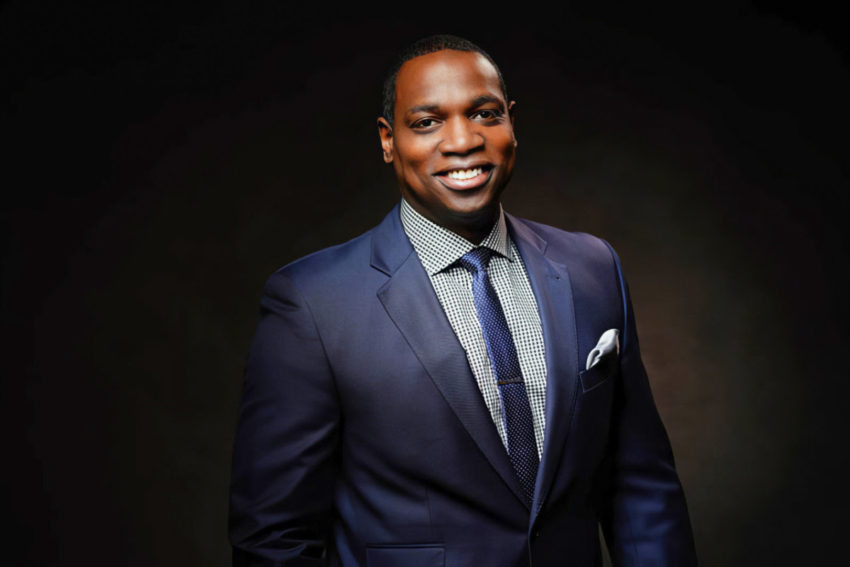
Galen Gordon Named to Key Role in Hiring Talent
ABC News has chosen Galen Gordon, a former ESPN coordinating producer and an African American, to succeed the disgraced Barbara Fedida, a white executive who left her position in July after an investigation confirmed that she had made unacceptable racially insensitive comments, the network announced Wednesday.
“Fedida, an award-winning producer, joined ABC News in 2011 as senior vice president for talent and business,” Brian Steinberg wrote in July for Variety. “As part of that role, she had a strong influence in determining who ABC News hired and the career paths of many of the news operation’s journalists and correspondents.”
Gordon is joining ABC News as senior vice president for talent strategy and development, ABC News President James Goldston said in Wednesday’s announcement. “He starts Monday, November 30 and will report to me.
“Galen will lead our talent team to identify emerging talent and development opportunities for our on-air and editorial team and the next generation of talent. He’ll work closely with Tonya Dobine to strengthen our pipeline across ABC News to attract, develop and retain a workforce that mirrors our audience and help us build a truly representative and inclusive culture where everyone has the opportunity to be heard, contribute and grow. . . .
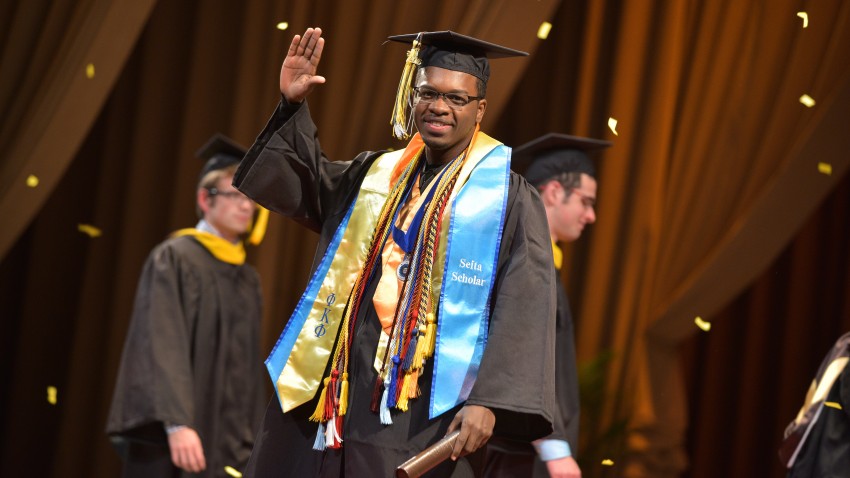
“A former ESPN coordinating producer and WABC producer, Galen is returning to the company after nearly three years as Vice President for the National Football League Media Group leading their talent management division.
“At the NFL Galen was responsible for creating a talent coaching and performance development program, fostering the relationship between the NFL,” the National Association of Hispanic Journalists and the National Association of Black Journalists, “recruiting all on-air talent and overseeing more than 60 on-air personnel for the NFL Network. He hired many notable anchors, hosts, reporters and analysts, including Jim Trotter, Joe Thomas, Michael Yam and MJ Acosta-Ruiz, who became the network’s first female host of color and the first female host of color to anchor a daily NFL show.
“Galen spent 11 years at ESPN, where he had an impressive track record for programming success and increasing his programs’ reach with multicultural audiences. . . .”
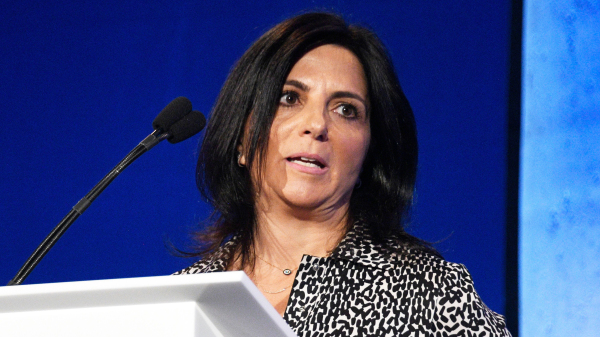 Peter Rice, chairman of Walt Disney Television, said in July that the investigation of Fedida (pictured) “substantiated that Ms. Fedida did make some of the unacceptable racially insensitive comments attributed to her. It also substantiated that Ms. Fedida managed in a rough manner and, on occasion, used crass and inappropriate language.”
Peter Rice, chairman of Walt Disney Television, said in July that the investigation of Fedida (pictured) “substantiated that Ms. Fedida did make some of the unacceptable racially insensitive comments attributed to her. It also substantiated that Ms. Fedida managed in a rough manner and, on occasion, used crass and inappropriate language.”
Steinberg reported then for Variety, “Disney intends to restructure Fedida’s role, he added, with ABC News business affairs being managed separately from talent relations and recruitment. He also said ABC News needed to ‘enhance the culture of inclusion and make further progress on our goal of attracting, fostering and retaining diverse talent.’ “
Upon Fedida’s departure, the National Association of Black Journalists urged:
- “Immediate redress for those who were wronged by Barbara Fedida
- “An African American should be put in charge of the network’s diversity-in-hiring program
- “ABC News/Disney should hire an outside consultant to assess the culture and work environment and policies at ABC News.”
[NABJ gave the appointment of Gordon “major applause” in an Oct. 29 statement.]
Medina, Bugg, Thomas-Fulton Promoted
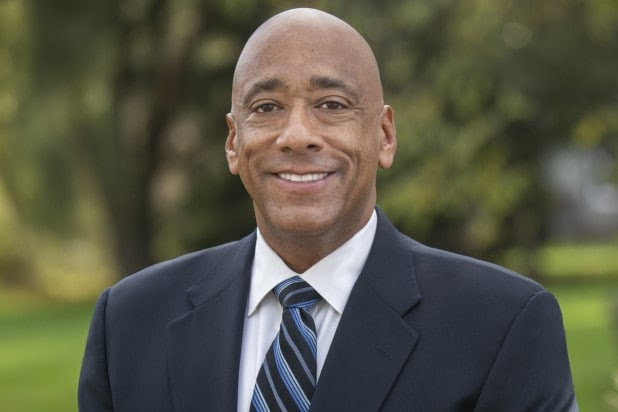 “ABC News announced Friday that Derek Medina (pictured) has been promoted to executive vice president within the company,” Lindsey Ellefson reported Friday for The Wrap.
“ABC News announced Friday that Derek Medina (pictured) has been promoted to executive vice president within the company,” Lindsey Ellefson reported Friday for The Wrap.
“Medina has served as ABC News’ senior vice president for business affairs, rights & clearances, archives and video sales since 2008. He’s been with the company itself for 22 years, having started in 1998 as a director for business affairs.
“He will now oversee the operations, business affairs, marketing, news practices, news administration, audio, insights and NewsOne teams.”
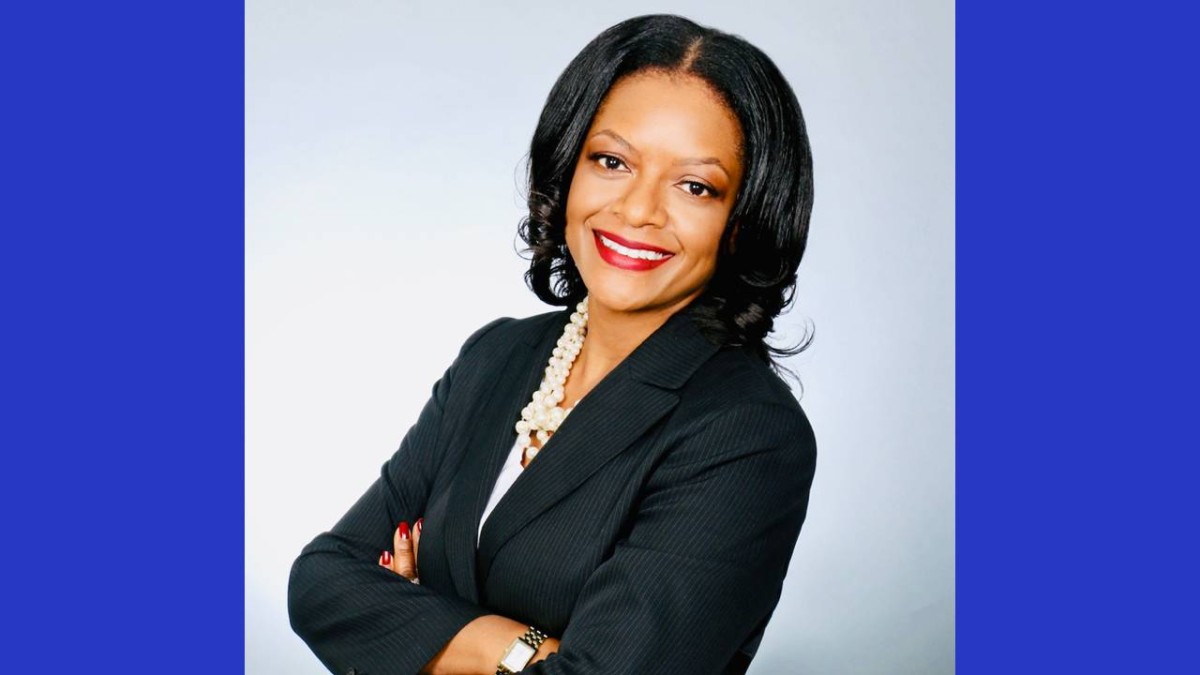 In public television, “PBS has promoted programming executive Sylvia Bugg (pictured) to chief programming executive and general manager of general audience programming,” Reid Nakamura reported Oct. 20 for The Wrap.
In public television, “PBS has promoted programming executive Sylvia Bugg (pictured) to chief programming executive and general manager of general audience programming,” Reid Nakamura reported Oct. 20 for The Wrap.
“In her new position, Bugg will oversee all non-children’s content and lead programming strategy across all broadcast and digital platforms. She will also be responsible for the acquisition and development of programming for PBS and its member stations, ‘with a particular focus on sharing important stories that reflect the diversity of our country,’ according to PBS.”
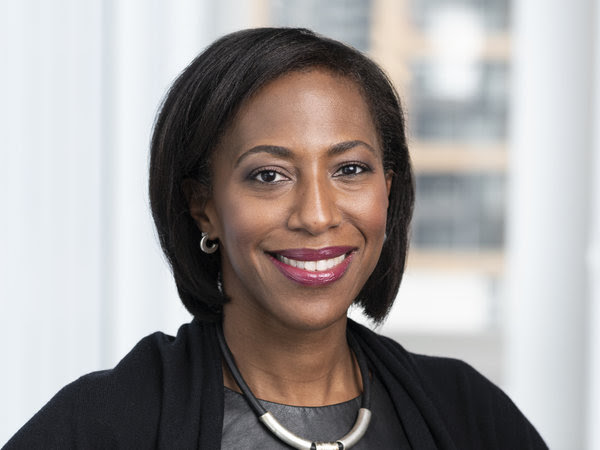 At NPR, the network announced Oct. 14 that “Sharahn Thomas-Fulton (pictured), currently Senior Director of News Operations, has been promoted to Vice President of Content Operations. Thomas-Fulton has been at NPR for 21 years, she started as an assistant producer and she has now been overseeing the newsroom’s operations for over 15 years.”
At NPR, the network announced Oct. 14 that “Sharahn Thomas-Fulton (pictured), currently Senior Director of News Operations, has been promoted to Vice President of Content Operations. Thomas-Fulton has been at NPR for 21 years, she started as an assistant producer and she has now been overseeing the newsroom’s operations for over 15 years.”
Carolyn Ryan, Ted Kim Advance at N.Y. Times
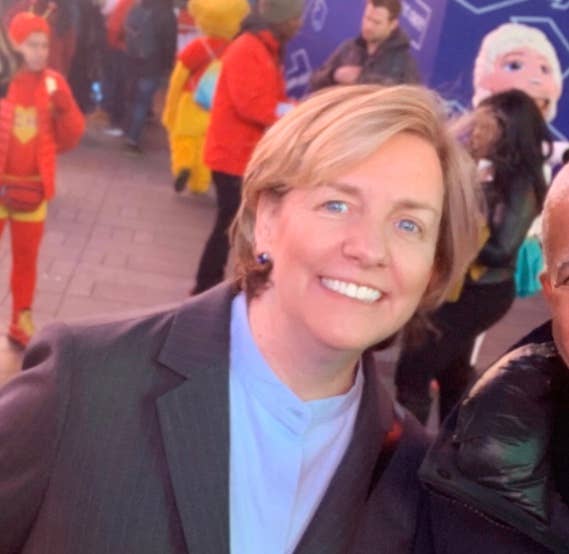 Carolyn Ryan (pictured), a leader of The New York Times’ Diversity, Equity and Inclusion initiative who “has driven some of our most important initiatives, including spotting and recruiting talent, helping shape our long-term strategy and culture, and overseeing high-impact journalism,” is being promoted to deputy managing editor.
Carolyn Ryan (pictured), a leader of The New York Times’ Diversity, Equity and Inclusion initiative who “has driven some of our most important initiatives, including spotting and recruiting talent, helping shape our long-term strategy and culture, and overseeing high-impact journalism,” is being promoted to deputy managing editor.
Executive Editor Dean Baquet and Managing Editor Joseph Kahn made the announcement Tuesday.
 That followed Ryan’s announcement Monday that “Ted Kim (pictured), who has made our journalism fellowship the gold standard in the industry, is being promoted to a new position of director of Early Career Journalism Strategy and Recruiting.
That followed Ryan’s announcement Monday that “Ted Kim (pictured), who has made our journalism fellowship the gold standard in the industry, is being promoted to a new position of director of Early Career Journalism Strategy and Recruiting.
“In this role, Ted will oversee all of our early career programs, build a more seamless pathway for students and up-and-coming journalists at The Times, and assist me in broader strategic efforts to build a more diverse newsroom staff.”
Kim is a former secretary of the Asian American Journalists Association, which coincidentally announced Wednesday “the launch of AAJA Studio, a curated list of 100+ AAPI journalists and media-ready subject matter experts who have been influential in their respective fields and issue areas, including but not limited to race relations, political campaigns, Asia-Pacific and international relations, civil rights and voting rights, health policy, immigration, and technology.”
Baquet and Kahn said of Ryan, “Diversity has been a core value to Carolyn throughout her career. Beginning in 2017, she oversaw a recruitment blitz for the newsroom, rethinking our approach to hiring and recruiting more than 400 new staff members in the newsroom, nearly 40 percent of them people of color.
“She helped Ted Kim establish our yearlong newsroom fellowship for early career journalists, which has become a key pipeline for us to bring diverse talent to The Times. (Almost two-thirds of this year’s fellows are journalists of color.)”
- New York Times Co.: New Roles for Manny Fernandez and Rick Rojas
Rochell Sleets, left, Chicago Tribune Life + Culture deputy editor, talks with the Tribune’s Heidi Stevens last year about the college admissions scandal. Fifty people were charged in a scam that involved school administrators, college athletic coaches, and wealthy parents accused of shelling out bribes. (Credit: YouTube)
2 at Chicago Tribune Named to Masthead
“For the second time in a month the Chicago Tribune has added a woman to its masthead,” Robert Feder reported Friday for his Chicago media website.
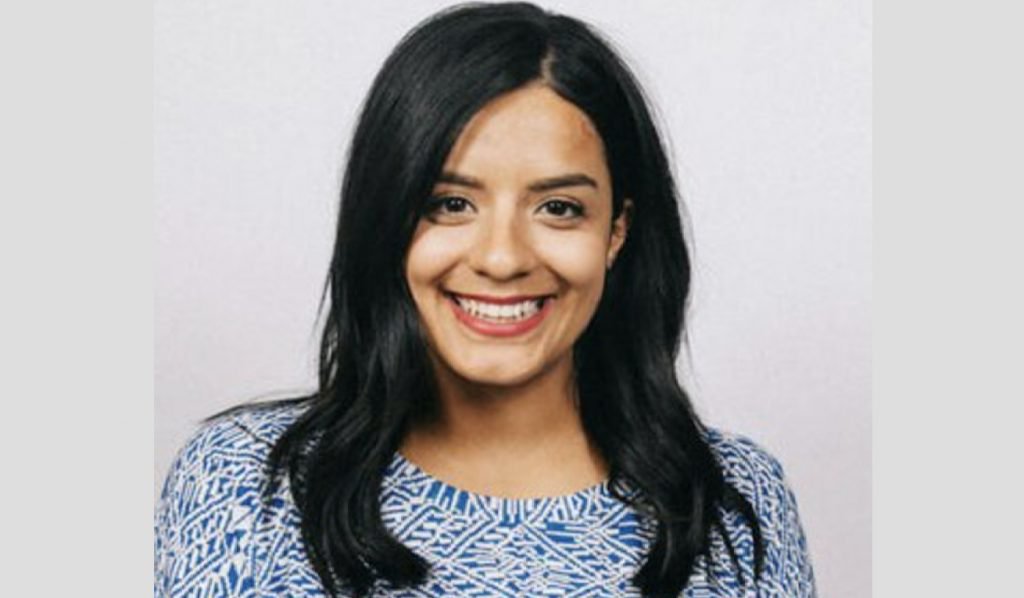 “On Thursday Michelle Lopez (pictured) , manager of editorial operations for Tribune Publishing, was named director of content for the Chicago Tribune. In a role equivalent to associate managing editor, she will report to editor-in-chief Colin McMahon.”
“On Thursday Michelle Lopez (pictured) , manager of editorial operations for Tribune Publishing, was named director of content for the Chicago Tribune. In a role equivalent to associate managing editor, she will report to editor-in-chief Colin McMahon.”
Feder also wrote, “Lopez’s appointment follows the announcement in September that Rochell Bishop Sleets, deputy editor of Life+Culture at the Chicago Tribune, had been promoted to a director of content.
“Women now outnumber men on the Tribune’s masthead, including managing editor Chrissy Taylor, editorial page editor Kristen McQueary, standards editor Margaret Holt, and content directors Amy Carr, Amanda Kaschube, Mary Ellen Podmolik, Sleets and, as of Monday, Lopez.”
In a note to the staff, McMahon and Taylor wrote, “Rochell will expand the content areas she oversees, working closely with the other directors and senior editors as we break down silos and align our local coverage with the topics important to our community right now.
“Under Rochell’s guidance the last five years, the Lifestyles team has helped reach new readers and retain our growing digital subscriber base by delivering relevant, insightful stories that provide perspective on social issues, education, health, parenting and more. With a combination of news judgment, collaborative brainstorming, and audience data insight, Rochell has refined the team’s approach to coverage. The result is a differentiated, timely report that helps readers navigate their daily lives.
“In addition to being an innovative editor, Rochell has been a leader in advocating for newsroom diversity and inclusion. She has worked tirelessly on steering committees, building resume databases, attending conferences, and serving as a mentor to ensure that all voices are heard and respected and that everyone is provided equal access to opportunity. She is an important voice whose presence on the masthead is well earned.”
New Berkeley J-Dean Wants to End Tuition
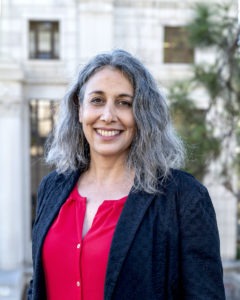 “I am thrilled to be the first woman of color — indeed, the first woman — to serve as dean of Berkeley Journalism,” Geeta Anand (pictured), an India-born veteran journalist who had been interim dean, wrote Wednesday.
“I am thrilled to be the first woman of color — indeed, the first woman — to serve as dean of Berkeley Journalism,” Geeta Anand (pictured), an India-born veteran journalist who had been interim dean, wrote Wednesday.
“After working for nearly 30 years as an investigative reporter, a foreign correspondent and a political reporter — in beats dominated by white men, I know how hard it is to have your work recognized, to be offered equal opportunities for advancement when perceived as other. I know how hard it is to rise within a system that makes it harder for you and your talents to be truly seen. . . .
“But the faculty and I want to do much, much more. The fact that so many Americans were shocked that a Black man could be killed in broad daylight, as was the case with George Floyd, illustrates how journalism has failed to tell all stories. Certainly, prior to the video of his death being broadcast across the world, people of color had known the pervasiveness of the brutality he suffered at the hands of law enforcement sworn to protect and serve. The fact that journalism missed the deep support Donald Trump had in 2016 also reflects that failure of journalism to truly see, understand and empathize with the suffering of alienated white Americans.
“The fact that it is mostly a privileged class of white men directing our news coverage means that journalism has missed critically important stories—or failed to recognize their significance, their pervasiveness, their consequence on the whole. Diversifying the race and gender and class of journalists is essential to making sure all stories get told to give this country a chance to see the many grave injustices that remain —- and address them.
“Berkeley Journalism intends to be a leader in diversifying journalism by raising a $100 million endowment to make the school tuition free. Journalism is an essential public service, vital for a democracy to thrive. We must reduce the barriers of entry in our profession to ensure first generation students, BIPOC [Black, Indigenous, People of Color] students, the children of immigrants, and gay and nonbinary students can become journalists.
“If our financial model is to graduate students with $70,000 in debt into a profession that is low paying, we will deter the very people whose voices need to be heard from even considering joining our school and our industry. Understanding this problem deeply, our faculty voted two years ago to work toward making our school tuition free. Today I am committing our school to this mission, the first I know of in journalism graduate education.”
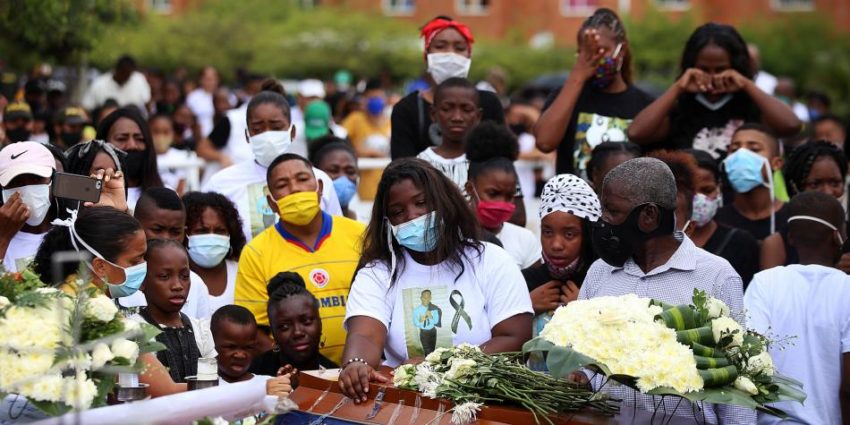
Latin American Media Have Own Diversity Issues
“In recent months, news headlines from Cuba to Brazil highlight the murders of Black and Indigenous men and youth, placing them in the context of a notorious case that had global repercussions,” Perla Arellano wrote Oct. 5, beginning a two-part series for the Knight Center for Journalism in the Americas.
“The similarities and differences between their murders and the killing of George Floyd at the hands of police in the U.S. sparked conversations regarding the lack of diversity in Latin American newsrooms and how crimes committed against Black and Indigenous peoples are covered in the region,” Arellano continued in the LatAm Journalism Review.
“According to some media professionals, coverage does not address racism as a structural and institutional problem, but an individual one. They even explained that the state-driven ideology that everyone is ‘mestizo’ contributes to the way journalists cover their region and racialized communities.”
Marco Avilés, journalist and doctoral student at the University of Pennsylvania, was among those interviewed.
“A very strong idea that prevents people from being horrified, the reflection of diversity and the lack of representation in newsrooms, explained Avilés, is the myth promoted by the republics that everyone is mestizo, a mixture of European, Indigenous and Black. This myth leads to the conclusion that everyone is the same and that what happens is not racism, but classism.
“And, although in the United States there are campaigns to diversify newsrooms, in Latin America the ideology of mestizaje means that ‘there is no need to diversify something that is already diversified,’ thus denying that racism exists in a certain country, he said.
” ‘Talking about diversity in the media is still a taboo subject, he added. When the journalist considers himself mestizo, he explained, it leads to the invisibility of Indigenous and Afro-descendant communities that are considered ‘like a sphere of alien reality.’ “
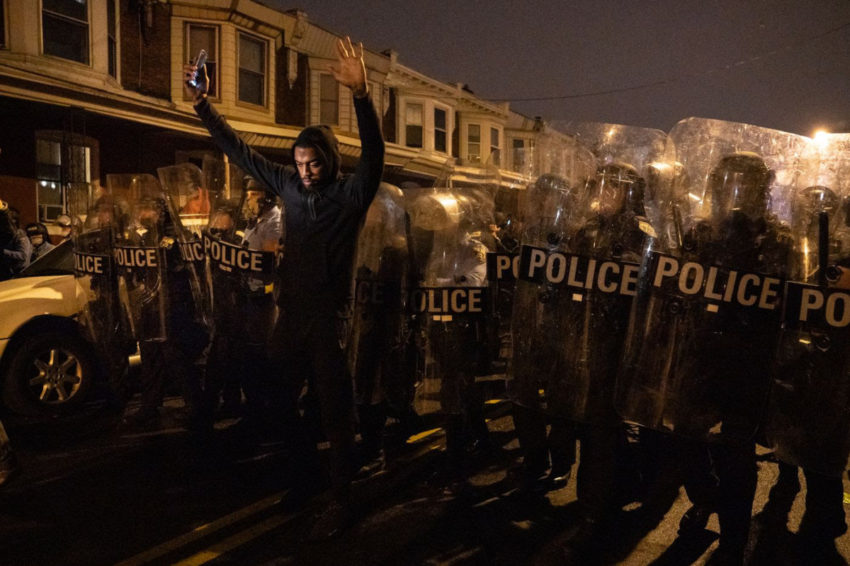
Inquirer Wants Footage Public in Police Killing
“If the police officers who shot Walter Wallace Jr. 10 times indeed did nothing wrong according to [Philadelphia Police Department] use-of-force protocol — which has been revised in recent years and is again under review — then the state of policing in Philadelphia is even more dire than we thought,” the Philadelphia Inquirer editorialized Tuesday.
“It also makes it more urgent to explore non-policing responses to behavior and mental health crises, as other evolved nations and cities do.
“Both of the police officers who shot Walter Wallace Jr. wore body cameras.” Mayor Jim Kenney and Police Commissioner Danielle Outlaw “should release the footage. In too many incidents, including the original excuse for the use of force on I-676, official footage contradicted the official account given to the public. The lack of trust in police also extends to its investigations of their own. Residents must see the evidence for themselves.
“After a Minneapolis police officer killed George Floyd, Kenney released strong statements condemning police brutality and Outlaw applauded the Minneapolis police chief for his ‘swift and certain response to this tragedy.’ Now when the tragedy hits closer to home, their action should match their rhetoric — and release the footage.”
- Jenice Armstrong, Philadelphia Inquirer: Walter Wallace Jr.: A Black life that mattered
- Tessa Duvall, Courier Journal, Louisville, Ky.: Two Breonna Taylor grand jurors are telling their story. Why that’s important
- Earl Ofari Hutchinson, Hutchinson Report: Did They Really Have to Shoot Walter Wallace Jr.?
- Solomon Jones, Philadelphia Inquirer: Walter Wallace Jr. would still be alive if he were a white man
- Helen Ubiñas, Philadelphia Inquirer: Philadelphia police, again, incapable of treating Black men as anything but a threat
- Alex Vitale, Philadelphia Inquirer: Walter Wallace Jr.’s tragic death a reminder police should not lead mental health response
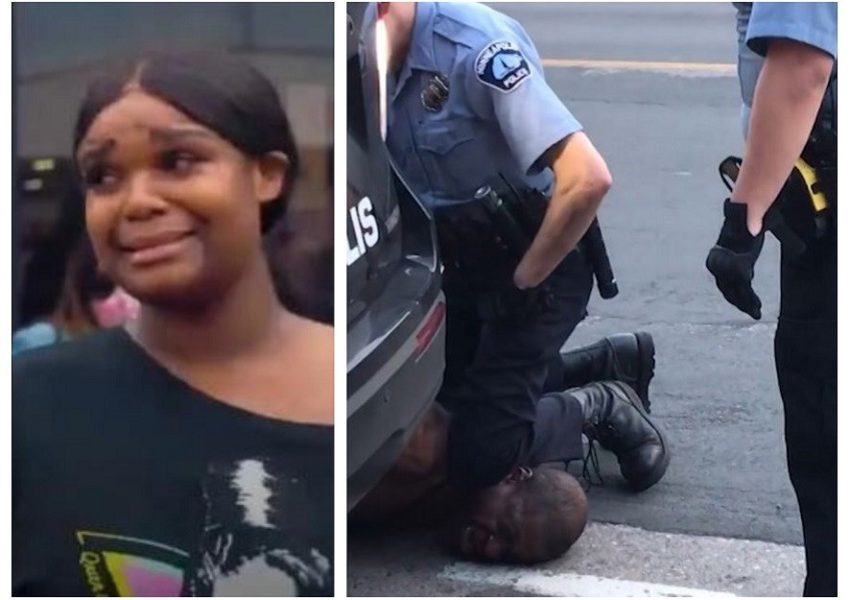
PEN America to Honor Teen Who Shot Floyd Video
“A leading literary and human rights organization said Tuesday that it is bestowing its annual Courage Award to the Minneapolis teenager whose video of George Floyd’s killing by Minneapolis police was viewed by millions and inspired global outrage,” Paul Walsh reported Wednesday for the Star Tribune in Minneapolis.
“Darnella Frazier will receive the Benenson Courage Award from PEN America during a virtual gala celebration on Dec. 8.
” ‘With nothing more than a cellphone and sheer guts, Darnella changed the course of history in this country, sparking a bold movement demanding an end to systemic anti-Black racism and violence at the hands of police,’ PEN America CEO Suzanne Nossel said in a statement announcing Frazier’s selection.
- Editorial, Los Angeles Times: California law on racist 911 calls sends a good message — but will do more harm than good
Debate Attendees From Fox Advised to Quarantine
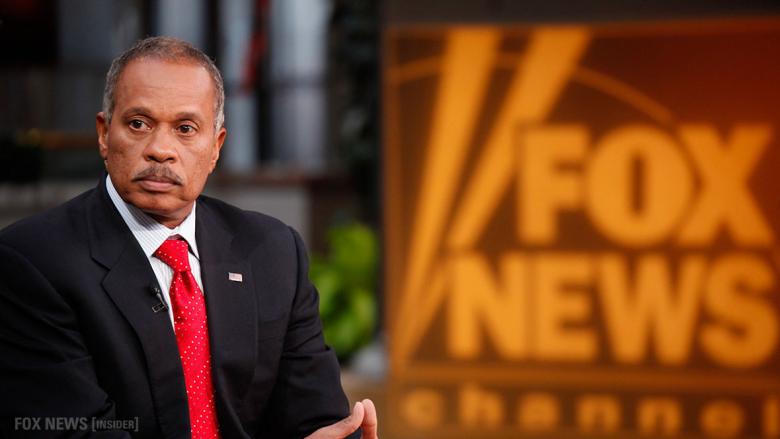 The president of Fox News and several of the network’s top anchors, including Juan Williams (pictured), a host of “The Five,” “have been advised to quarantine after being exposed to someone on a private flight who later tested positive for the coronavirus, two people with direct knowledge of the situation said on Sunday,” Jeremy W. Peters reported Monday for The New York Times.
The president of Fox News and several of the network’s top anchors, including Juan Williams (pictured), a host of “The Five,” “have been advised to quarantine after being exposed to someone on a private flight who later tested positive for the coronavirus, two people with direct knowledge of the situation said on Sunday,” Jeremy W. Peters reported Monday for The New York Times.
“The infected person was on a charter flight to New York from Nashville with a group of network executives, personalities and other staff members who attended the presidential debate on Thursday, according to the people, who spoke on the condition of anonymity to discuss internal network matters.
“Everyone on board the plane has been told to get tested and quarantine. It was unclear whether more than one person had tested positive.
“Those who were exposed include Jay Wallace, the president of Fox News Media; Bret Baier, the chief political anchor; Martha MacCallum, the anchor of Fox’s 7 p.m. show, ‘The Story’; and Dana Perino and Juan Williams, two hosts of ‘The Five.’
“A network representative would not confirm any details of the exposure, citing the need to keep private health information confidential.”
Williams did not respond to a request for comment.
- Jeremy Barr, Washington Post: Fox News veterans face a hurdle in the job market: Having Fox on the résumé (Oct. 15)
- Suzy Exposito and Daniel Hernandez, Los Angeles Times: CBS gave Latinos an hour of prime-time TV to honor essential workers. Did it land?
Quibi Streaming Service to Close After 6 Months
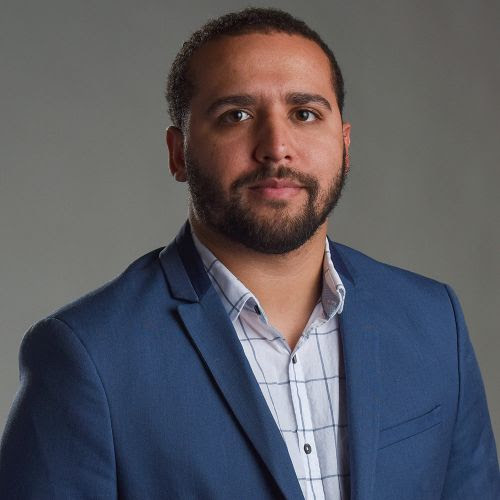 “Quibi Holdings LLC is shutting down a mere six months after launching its streaming service, a crash landing for a once highly touted startup that attracted some of the biggest names in Hollywood and had looked to revolutionize how people consume entertainment,” Benjamin Mullin, Joe Flint and Maureen Farrell reported Oct. 22 for the Wall Street Journal. (paywall)
“Quibi Holdings LLC is shutting down a mere six months after launching its streaming service, a crash landing for a once highly touted startup that attracted some of the biggest names in Hollywood and had looked to revolutionize how people consume entertainment,” Benjamin Mullin, Joe Flint and Maureen Farrell reported Oct. 22 for the Wall Street Journal. (paywall)
However, Wesley Lowery (pictured), the former Washington Post reporter who was one of Quibi’s most prominent recruits, told Journal-isms that “our show will likely get sold elsewhere.” He added, “Nothing imminent for me in the short term, but certainly a shakeup.” Lowery is a correspondent for “60 in 6,” a new “60 Minutes” program for Quibi.
Lowery was also named to a part-time position at the University of California at Berkeley, joining Berkeley Journalism’s Investigative Reporting Program as special projects editor this semester, the school announced Oct. 20. Lowery is leading a team of graduate students investigating police misconduct in the United States and is offering advice and guidance on other IRP investigations.
The Journal story continued, “The streaming service, which served up shows in 5- to 10-minute ‘chapters’ formatted to fit a smartphone screen, has been plagued with problems since its April debut, facing lower-than-expected viewership and a lawsuit from a well-capitalized foe.
“ ‘Our failure was not for lack of trying,’ founder Jeffrey Katzenberg and Chief Executive Meg Whitman said in an open letter to employees and investors. ‘We’ve considered and exhausted every option available to us.’
“Mr. Katzenberg and Ms. Whitman decided to shut down the company in an effort to return as much capital to investors as possible instead of trying to prolong the life of the company and risk losing more money, according to people familiar with the matter.
“Employees will be laid off and will be paid a severance, the people said, and Quibi will explore selling the rights to some of its content to other media and technology companies.”
Short Takes
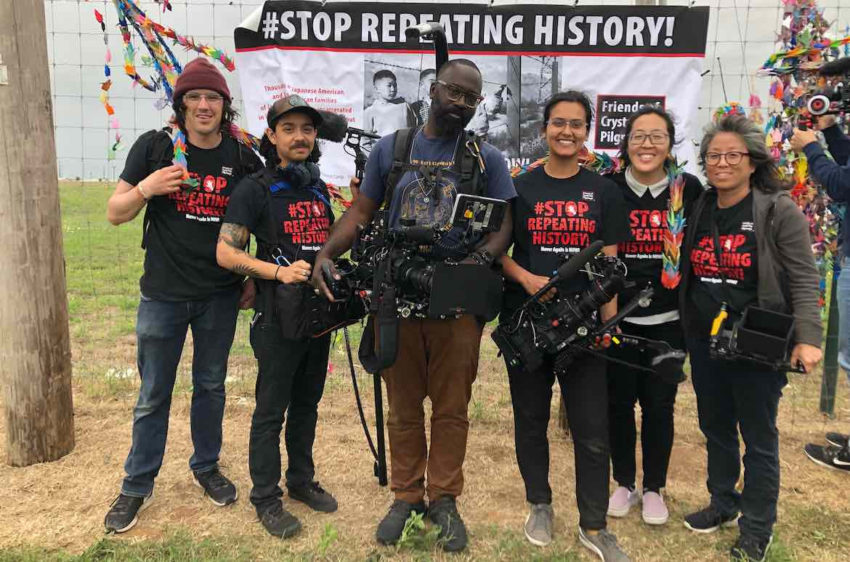
- “For many, public television is synonymous with Ken Burns. Documentary series like The Civil War, Baseball, Jazz and The Vietnam War have led PBS to market him as ‘America’s storyteller,’ as if there were only room for one,” independent filmmaker Grace Lee wrote for the Ford Foundation’s Creativity and Free Expressions program, republished Oct. 22 in Current. “It’s worth remembering how and why PBS came to be, and time to reinvent this system for today’s America.” Lee urged, “Fund seasoned BIPOC [Black, Indigenous, People of Color] filmmakers at the same level that PBS has supported Ken Burns for the past 40 years. Burns is a reliable moneymaker for PBS, but that doesn’t mean others could not be. Risk aversion is a real concern within a system threatened by defunding every year, but this is the time to be bold.”

- “When British TV got its first black reporter in 1968 some viewers strongly objected and she was sacked in less than a year,” Simi Jolaoso wrote Friday for the BBC. “Now, half a century later, a British Journalism Award has been named in her honour. Looking back, how does Barbara Blake Hannah feel about the way the country treated her? ‘Too many times you buy a sandwich that you later realise had been spat in, or you’re walking down the street and are spat at yourself, or best case scenario, are told “[N-word] go home.” But when I roamed the streets as a reporter with a camera, no-one cared that I was black. They just cared about being on TV, that’s one reason why I loved the job.’ “
- “Vogue’s September issue celebrated Black culture and contributors. But some employees say the magazine’s powerful editor fostered a workplace that sidelined women of color,” reads a headline in The New York Times over a weekend story by Edmund Lee. Referring to Anna Wintour, the Vogue editor in chief since 1988 and Condé Nast’s artistic director since 2013, Lee wrote, “Many Black people who worked for her said they felt so out of place in Ms. Wintour’s domain that they created white alter egos — two used the term ‘doppelgänger’ — just to get through the workday, reconditioning their presentation and dress in a way that was mentally draining.”
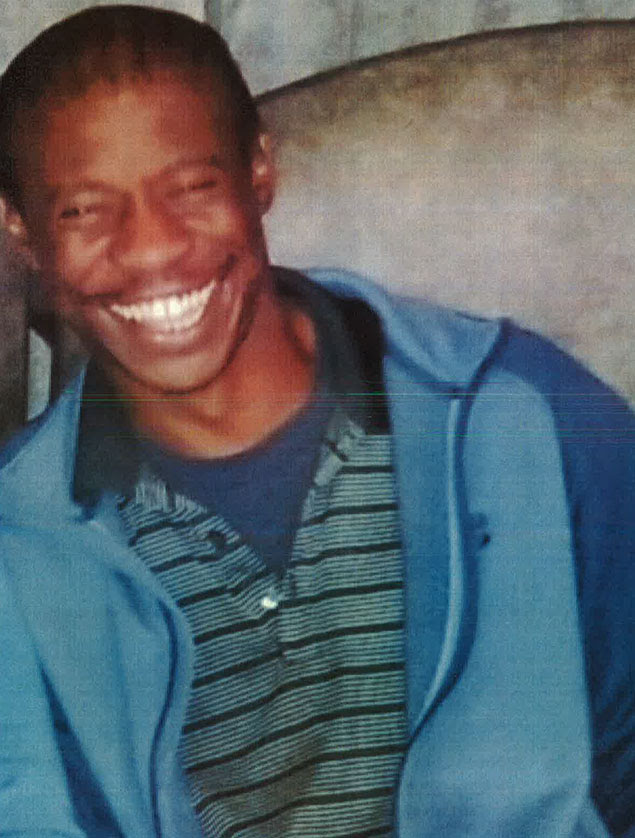 Harvey Hill’s (pictured) “is one of 7,571 inmate deaths Reuters documented in an unprecedented examination of mortality in more than 500 U.S. jails from 2008 to 2019,” Peter Eisler, Linda So, Jason Szep, Grant Smith and Ned Parker wrote Oct. 16. “Death rates have soared in those lockups, rising 35% over the decade ending last year. Casualties like Hill are typical: held on minor charges and dying without ever getting their day in court. At least two-thirds of the dead inmates identified by Reuters, 4,998 people, were never convicted of the charges on which they were being held.”
Harvey Hill’s (pictured) “is one of 7,571 inmate deaths Reuters documented in an unprecedented examination of mortality in more than 500 U.S. jails from 2008 to 2019,” Peter Eisler, Linda So, Jason Szep, Grant Smith and Ned Parker wrote Oct. 16. “Death rates have soared in those lockups, rising 35% over the decade ending last year. Casualties like Hill are typical: held on minor charges and dying without ever getting their day in court. At least two-thirds of the dead inmates identified by Reuters, 4,998 people, were never convicted of the charges on which they were being held.”
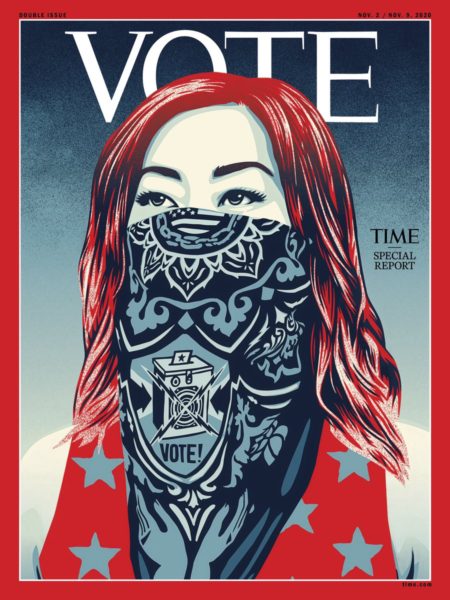
- Time magazine “has for the first time in its nearly 100-year history replaced its logo with a call to vote,” CNN’s Oliver Darcy tweeted Oct 22. “The cover artwork is by Shepard Fairey who says it depicts a person determined to vote despite the ‘additional challenges to democracy during a pandemic.’ ”
- “President Donald Trump portrays the hundreds of people arrested nationwide in protests against racial injustice as violent urban left-wing radicals,” Alanna Durkin Richer, Colleen Long and Michael Balsamo reported Oct. 20 for the Associated Press. “But an Associated Press review of thousands of pages of court documents tell a different story. Very few of those charged appear to be affiliated with highly organized extremist groups, and many are young suburban adults from the very neighborhoods Trump vows to protect from the violence in his reelection push to win support from the suburbs.”
- “When a routine tally of New York’s top 50 political operatives was published over the summer, a group of Black consultants immediately took note of the list’s lack of racial diversity,” Sally Goldenberg reported Oct. 20 for Politico. She identified the publication as City & State and added, “Last week, after the same publication ran a story claiming a sitting Black female lawmaker ‘crashed, burned and flamed out,’ the consultants said they’d had enough. Despite several apologies and swift corrective action from the publisher, Tom Allon, they are forming an advocacy organization to force change in how they are depicted in media coverage. The nascent group, Association of Black Lobbyists and Political Consultants, launched with a letter to Allon on Monday demanding sustained improvements.”
 “Frustrated by tired stereotypes and the lack of diversity in entertainment, a female journalist and filmmaker named DeShuna Spencer (pictured) created kweliTV to be a catalyst for change and a space for Black thought leaders, journalists, filmmakers and creatives to give voice to the African Diaspora,” J.R. Gamble wrote Monday for The Shadow League. Gamble also wrote, “The platform features content hailing everywhere from the United States to Colombia to Rwanda and 98% of their films have been official selections at film festivals. KweliTV is available on Amazon Fire / Roku / Apple TV / GooglePlay / iOS / Chromecast / Cox.”
“Frustrated by tired stereotypes and the lack of diversity in entertainment, a female journalist and filmmaker named DeShuna Spencer (pictured) created kweliTV to be a catalyst for change and a space for Black thought leaders, journalists, filmmakers and creatives to give voice to the African Diaspora,” J.R. Gamble wrote Monday for The Shadow League. Gamble also wrote, “The platform features content hailing everywhere from the United States to Colombia to Rwanda and 98% of their films have been official selections at film festivals. KweliTV is available on Amazon Fire / Roku / Apple TV / GooglePlay / iOS / Chromecast / Cox.”
- “State officials have ordered an outside investigation into the Virginia Military Institute following a report in The Washington Post that described Black cadets and alumni facing ‘relentless racism,’ ” the Associated Press reported Oct. 20. On Monday, Retired Gen. J.H. Binford Peay III, superintendent of the school, resigned.
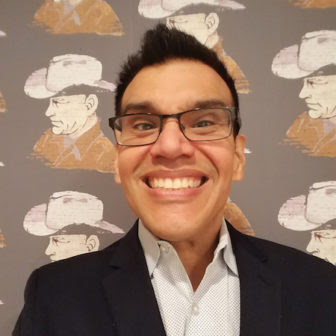 People of color “came together to found and lead Public Media for All, an initiative to raise awareness about the negative effects of public media’s white-dominated culture and power structure,” Ernesto Aguilar (pictured) and other members of the group wrote Oct. 19 for Current. “Our vision is to share solutions for individuals and organizations to address problems with diversity, equity and inclusion. As with any effort of this nature, some of us are privileged enough to speak openly. Others, due to life or work factors, have less visible roles. Nevertheless, all of us are united in pursuit of a better public media industry.” Aguilar is program director of the National Federation of Community Broadcasters.
People of color “came together to found and lead Public Media for All, an initiative to raise awareness about the negative effects of public media’s white-dominated culture and power structure,” Ernesto Aguilar (pictured) and other members of the group wrote Oct. 19 for Current. “Our vision is to share solutions for individuals and organizations to address problems with diversity, equity and inclusion. As with any effort of this nature, some of us are privileged enough to speak openly. Others, due to life or work factors, have less visible roles. Nevertheless, all of us are united in pursuit of a better public media industry.” Aguilar is program director of the National Federation of Community Broadcasters.
- “Inspired by her legacy and the chance for ‘poetic justice,’ an Atlanta school board committee recommended renaming Henry W. Grady High School to honor another journalist: Ida B. Wells,” Vanessa McCray reported Oct. 21 for The Atlanta Journal-Constitution.
- “There has been a lot of progress for women and people of color in front of the camera,” said Darnell Hunt, dean of the division of social sciences in the UCLA College and a co-author of the 2020 UCLA Hollywood Diversity Report, released Oct. 22. “Unfortunately, there has not been the same level of progress behind the camera. Most notably in the executive suite, there has been very little change since we began compiling data five years ago. That’s very telling, particularly in light of our current racial reckoning.”
- “America’s most prominent endowment chief has a message for the firms that manage the school’s money: Hire more women and minorities, or possibly lose the university’s backing,” Juliet Chung and Dawn Lim reported Friday for the Wall Street Journal (paywall). “David Swensen is the veteran investment chief of Yale University’s $31.2 billion endowment. Earlier this month, he told the dozens of firms that manage Yale’s money they would be measured on their progress increasing the diversity of their investment staffs.” Telecrunch
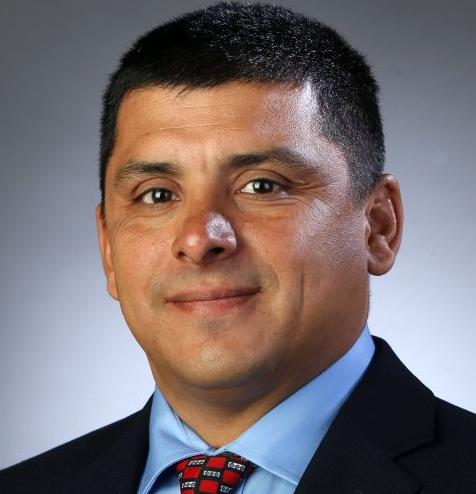 Jesus Ortiz (pictured), former St. Louis Post-Dispatch sports columnist who spent 15 years as an Astros beat writer and national baseball and soccer writer at the Houston Chronicle, is previewing Our Esquina, a website focusing on telling the Latino story in sports and culture to an English-preferred audience. “Our Esquina will launch on Jan. 22 with a website, podcast network and a production company,” Ortiz writes. He is also a former national president of the Baseball Writers’ Association of America.
Jesus Ortiz (pictured), former St. Louis Post-Dispatch sports columnist who spent 15 years as an Astros beat writer and national baseball and soccer writer at the Houston Chronicle, is previewing Our Esquina, a website focusing on telling the Latino story in sports and culture to an English-preferred audience. “Our Esquina will launch on Jan. 22 with a website, podcast network and a production company,” Ortiz writes. He is also a former national president of the Baseball Writers’ Association of America.
- Benjamin Chavis Jr., president and CEO of the National Newspaper Publishers Association, has begun broadcasting “The Chavis Chronicles,” which “focuses on contemporary reviews and analysis of leaders and innovators of African descent in America and throughout the Diaspora,” NNPA’s Stacy M. Brown reported on Oct. 14. “American Public Television has ordered 48, one-hour episodes of the Chavis Chronicles which airs in more than 100 cities,” Brown wrote.
- Michael Cottman, most recently editorial manager for NBCBLK, is joining the NBCU News Group Diversity, Equity and Inclusion team as a program editor “managing academic and on-campus learning partnerships supporting the growth and expansion of our online learning platform,” Yvette Miley, senior vice president, diversity and inclusion for NBC News and MSNBC, wrote to staff members Oct. 22.
 “Prism’s journalism is about a number of different themes: gender, elections, criminal justice, immigration, race, and worker’s rights,” Hanaa’ Tameez reported for Nieman Reports. “But those issues often intersect. ‘As we built our reporting team and our relationships with freelance folks, we started to see the degree to which all of these issues are interconnected,’ ” editor-in-chief Ashton Lattimore (pictured) said. “ ‘A lot of our workers’ rights stories are also gender justice stories, and a lot of our immigration stories are also racial justice stories.” The report is headlined, “Prism, a news site led by women of color, centers the voices of marginalized people in its reporting.”
“Prism’s journalism is about a number of different themes: gender, elections, criminal justice, immigration, race, and worker’s rights,” Hanaa’ Tameez reported for Nieman Reports. “But those issues often intersect. ‘As we built our reporting team and our relationships with freelance folks, we started to see the degree to which all of these issues are interconnected,’ ” editor-in-chief Ashton Lattimore (pictured) said. “ ‘A lot of our workers’ rights stories are also gender justice stories, and a lot of our immigration stories are also racial justice stories.” The report is headlined, “Prism, a news site led by women of color, centers the voices of marginalized people in its reporting.”

- “What started as an idea, has turned into lasting opportunities for journalism students at the University of Central Florida,“ Brooke Savage reported Oct. 15 for WKMG-TV in Orlando. “UCF’s Nicholson School of Communication and Media’s Hispanic Media Initiative. Knightly Latino, a Spanish-television news program, offers a way for students to report on the Hispanic and Latinx community on campus, and broaden their job opportunities by learning more about Spanish-language media. Students can either take a course or a certificate program which would be a supplement to their diploma.”
- “NBC News reported last week that lawyers say they can’t reunite 545 children separated from their families at the border as part of President Donald Trump’s anti-immigration policy,” Courtney Hagle wrote Tuesday for Media Matters for America. “The policy has been widely criticized as inhumane, and Trump himself attempted to blur the lines of responsibility and soften the reality of what his administration did when he was questioned about it at a presidential debate. Right-wing media has dutifully backed him up, insisting that critics are misrepresenting the policy or lying about the facts behind its origins and implementation.”
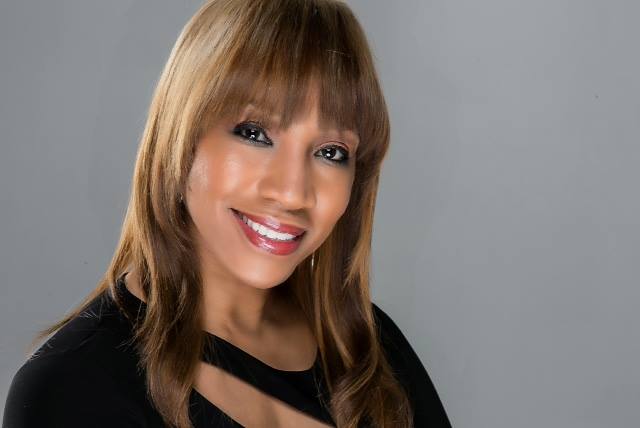 Cheryl Grace, (pictured) Nielsen’s senior vice president of U.S. strategic community alliances and consumer engagement, the founder and spokesperson for the company’s series on buying power of U.S. multicultural consumers, filed suit Tuesday against Nielsen. “According to Grace’s claim, despite numerous efforts over the years to advance beyond a senior vice president role, which she’s held for 13 out of her 16 years with the company, Nielsen has failed to promote her in spite of her high performance,” Digital and Radio Facts reported Tuesday.
Cheryl Grace, (pictured) Nielsen’s senior vice president of U.S. strategic community alliances and consumer engagement, the founder and spokesperson for the company’s series on buying power of U.S. multicultural consumers, filed suit Tuesday against Nielsen. “According to Grace’s claim, despite numerous efforts over the years to advance beyond a senior vice president role, which she’s held for 13 out of her 16 years with the company, Nielsen has failed to promote her in spite of her high performance,” Digital and Radio Facts reported Tuesday.
- “He’s on WDIV-TV (Channel 4) every morning before the crack of dawn, and many know that local anchor Evrod Cassimy is also an accomplished singer,” Melody Baetens reported Monday for The Detroit News. “His latest release is a holiday EP, ‘A Cassimy Kinda Christmas.’ It comes out Nov. 1 on Spotify and Apple Music. Listeners can pre-save it now at evrodcassimy.com.”
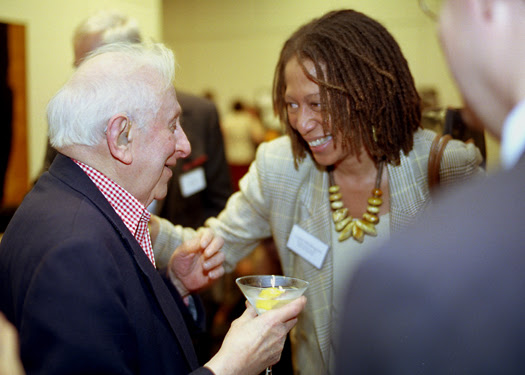
- “Since May 2020, racial justice and systemic inequality have consistently been front-page news . . .But Chicago journalist Laura S. Washington has been on this beat all along,” Mareva Lindo wrote Oct. 19 for Public Narrative. ” ‘I cared about this stuff a long time before a lot of people should have cared about it,’ she said. Growing up in neighborhoods across the city’s South Side, ‘You grew up seeing so many inequities, and you want to right them and you want to change them,’ said Laura. ‘The challenges that I had, growing up in a segregated community in Chicago as a working class young woman, turned into advantages, because it gave me an appreciation of how important it was to highlight those issues.’ ”
- In Detroit, “The Plaindealer newspaper was founded in 1883 by brothers Benjamin and Robert Pelham Jr., Walter H. Stowers and W.H. Anderson with a mission to promote civil rights and provide coverage of local and national events,” Kyla L. Wright reported Oct. 16, updated Oct. 18, for the Detroit Free Press. “Detroit’s first ‘Afro-American’ newspaper, as the founders called it, rejected the term ‘negro.’ It also was one of the first papers of its kind in the country. The Plaindealer ceased publication in 1894 due to lack of funding, but its legacy will now remain downtown, mounted at the corner of the Westin Book Cadillac at Shelby and State – its former office. The Plaindealer initially received its [historical] marker approval in 1977, but it wasn’t erected until this year.”
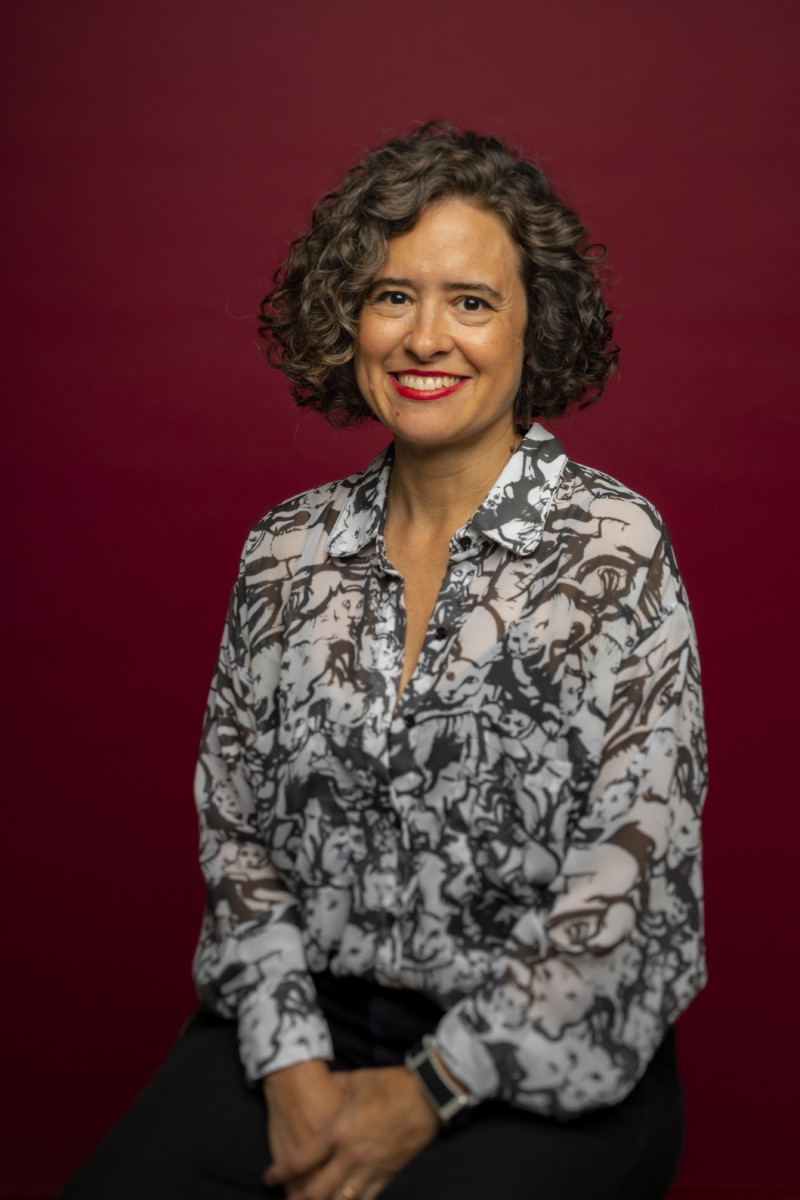 “Carolina A. Miranda (pictured) has been appointed arts and urban design columnist for The Times,” Los Angeles Times Executive Editor Norman Pearlstine announced to the staff on Oct. 22. “In her new role, Carolina will cover art, architecture, urban development and design, with a particular focus on equity, access, and the lived experience of Los Angeles for all of its residents. Carolina will approach this work with a columnist’s voice and critic’s viewpoint in addition to her unending reporter’s curiosity. Along with regular reported columns and perspective pieces, Carolina will continue to write occasional features and interviews, keeping an eye throughout on who gets arts and architecture commissions and what gets made. She will also continue to seek out new artists and subcultures. Carolina’s debut column, “Are Art Museums Still Racist?,” is an examination of how museums have responded to the COVID crisis and the questions about systemic racism raised this summer in the wake of George Floyd’s killing; it looks at whether 2020 has worsened inequities or could prompt change.”
“Carolina A. Miranda (pictured) has been appointed arts and urban design columnist for The Times,” Los Angeles Times Executive Editor Norman Pearlstine announced to the staff on Oct. 22. “In her new role, Carolina will cover art, architecture, urban development and design, with a particular focus on equity, access, and the lived experience of Los Angeles for all of its residents. Carolina will approach this work with a columnist’s voice and critic’s viewpoint in addition to her unending reporter’s curiosity. Along with regular reported columns and perspective pieces, Carolina will continue to write occasional features and interviews, keeping an eye throughout on who gets arts and architecture commissions and what gets made. She will also continue to seek out new artists and subcultures. Carolina’s debut column, “Are Art Museums Still Racist?,” is an examination of how museums have responded to the COVID crisis and the questions about systemic racism raised this summer in the wake of George Floyd’s killing; it looks at whether 2020 has worsened inequities or could prompt change.”
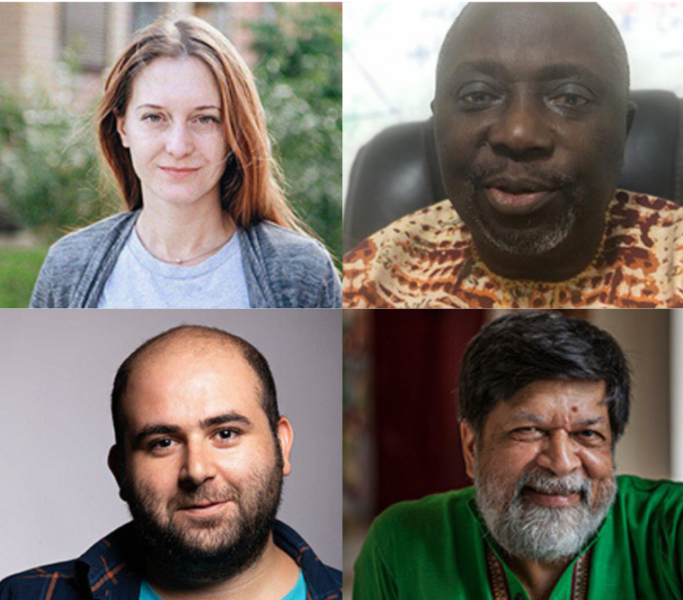
- “In celebration of the resiliency of the press, the Committee to Protect Journalists will honor four journalists from Bangladesh, Iran, Nigeria and Russia who have been arrested or faced criminal prosecution in reprisal for their work,” CPJ announced Tuesday. “CPJ will celebrate four awardees: renowned Bangladeshi photojournalist Shahidul Alam, imprisoned while covering protests in 2018; freelance Iranian reporter Mohammad Mosaed, recently sentenced to more than four years behind bars and banned from practicing journalism; Dapo Olorunyomi, the co-founder, CEO, and publisher of the Nigerian newspaper Premium Times and long-time press freedom champion; and Svetlana Prokopyeva, a correspondent for Radio Free Europe/Radio Liberty in Russia who was convicted on charges of ‘justifying terrorism’ in retaliation for comments she made on a radio show.”
- “Twelve years after a New York Times journalist and two others were taken hostage at gunpoint in Afghanistan and held for more than seven months, an Afghan man has been arrested and charged in the kidnapping, federal authorities said on Wednesday,” Benjamin Weiser reported for The New York Times. “The man, Haji Najibullah, who has been described as a former Taliban commander, was ordered detained by a federal magistrate judge in Manhattan on Wednesday. The journalist, David Rohde, as well as an Afghan journalist, Tahir Ludin, eventually made a desperate nighttime escape in June 2009. . . . “
- “Men wearing military uniforms abducted and mistreated a Sudanese journalist in downtown Khartoum on Thursday. Another journalist was refused access to a press conference,” Radio Dabanga reported Monday from Khartoum, Sudan’s capital. “Mohamed Jadin, working for El Sayha newspaper, was going home on Thursday evening, when a group of armed men wearing military uniforms abducted him in their Land Cruiser. The men beat him, stole his cell phone, and finally let him go at the White Nile near Acacia forest in central Khartoum.” The Sudanese Journalists Network called the incident “a dangerous indicator, which shows that walking in the streets of Khartoum is no longer safe for citizens.”
- Bolivia’s Movement Towards Socialism (MAS) party won a decisive victory in the country’s presidential elections on Sunday, with its candidate Luis Arce apparently winning by a large enough margin to avoid a runoff, likely achieving an absolute majority,” Bryce Greene wrote Friday for Fairness & Accuracy In Reporting. “The leading opposing candidate, neoliberal Carlos Mesa, and the right-wing unelected President Jeanine Áñez congratulated Arce on his victory. Some in US corporate media, however, failed to describe what was really going on in the country. . . . It may seem surprising that so much reporting on Bolivia still ignores facts that are critical to understanding the situation there, but US media have a long history of reporting on Latin America that does more to please the State Department than to inform readers.”
- “Nigerian authorities should ensure that journalists are able to do their jobs freely and safely while covering protests against police brutality in the country,” the Committee to Protect Journalists said Oct. 21. “In recent days, local media have reported violence against protesters and journalists during the demonstrations in Nigeria, which began as a movement to disband the police’s Federal Special Anti-Robbery Squad.”
- In Venezuela, a “plummeting of general living standards, further accentuated by the COVID-19 pandemic, represents just one major roadblock for the Venezuelan press,” Nathalia González wrote Oct. 12 for the International Press Institute. “Journalists are often unable to report due to obstacles like gasoline scarcity, which prevents them from reaching relevant sites. The country is also facing a newspaper scarcity. With the Maduro administration’s indefatigable censoring and stigmatization of the press, it is no surprise that the number of print newspapers operating within Venezuela is less than a third of what it was seven years ago.”
- “A Thai news outlet connected to exiled former prime minister Thaksin Shinawatra has been ordered to shut down over its coverage of anti-government protests in Bangkok as demonstrators prepared to take to the streets for a sixth consecutive day,” Agence France-Presse reported Oct. 20. “Voice TV, a website partly owned by Thaksin’s family, was one of four media organisations under fire for their reporting of the youth-led pro-democracy protest movement and has been critical of the government.”
- “Two leading media freedom organisations have issued a joint call on the Indian authorities to take urgent action to prevent the increasing use of sedition laws and other legal sanctions to threaten and silence independent journalists,” the International Press Institute reported Oct. 21. “In a joint letter the International Federation of Journalists (IFJ) and the International Press Institute (IPI), urged Indian Prime Minister Narendra Modi ‘to take immediate steps to ensure that journalists can work without harassment and fear of reprisal and to direct the state governments to drop all charges against journalists, including those under the draconian sedition laws, that have been imposed on them for their work.’ ”
- In Spain, “Barcelona player Ansu Fati received an apology in a Spanish newspaper on Thursday for being profiled racially by one of its journalists,” the Associated Press reported Oct. 22. “ABC journalist Salvador Sostres wrote of Barcelona’s win over Ferencvaros on Tuesday that ‘Ansu when running has something of a gazelle, or a very young, black street vendor running’ away from police.”
‘Skee-Wees,’ Screeches and Nuance
October 27, 2020
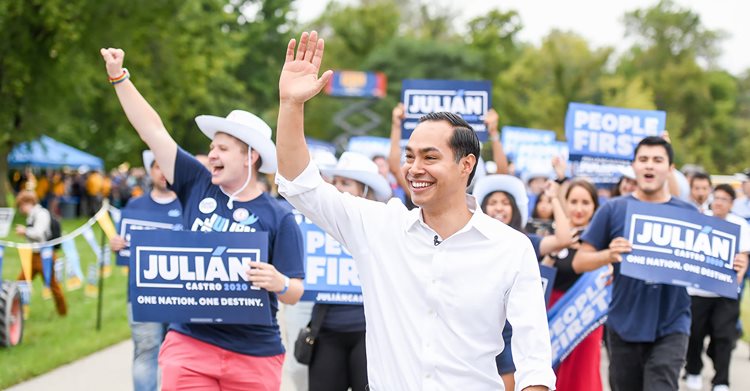
Castro Saw Difference While a Candidate
Support Journal-ismsCastro Saw Difference While a Candidate
“I could see in my own campaign on the trail,” Julián Castro (pictured) was saying, “that journalists of color often got the nuance.” They covered the campaign “much more solidly and were willing to put that [nuance] in the stories more.
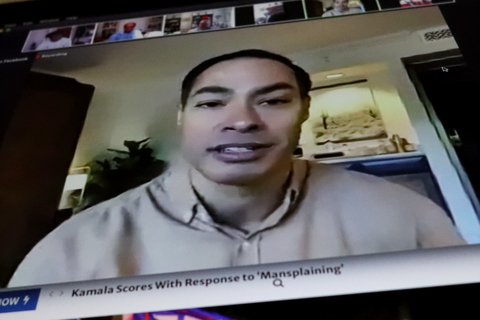 “We know that in newsrooms around the country, from the most prestigious papers to local newspapers, that are covering important community issues, the mainstream media have done a terrible job, just like Hollywood and much of corporate America, especially Silicon Valley, with diversity.”
“We know that in newsrooms around the country, from the most prestigious papers to local newspapers, that are covering important community issues, the mainstream media have done a terrible job, just like Hollywood and much of corporate America, especially Silicon Valley, with diversity.”
Castro is the former Obama housing secretary and mayor of San Antonio who competed with Joe Biden, Kamala Harris and others this campaign season for the Democratic presidential nomination.
The Sunday he spoke, Oct. 18, he was in Arizona campaigning for the Biden-Harris ticket and dialing into the Journal-isms Roundtable’s Zoom call (video) (narrative and photos) (column). He predicted that Latinos could be prime players in determining every general election, with states such as Texas (38 electoral votes), Arizona (11) and Georgia (16) added to Florida (29) as places where Latinos could determine the outcome. He was elated by the “massive interest, tremendous interest” evidenced in the early turnout in Texas.
Castro also said the news media had learned lessons from the 2016 race, when networks gave Donald Trump too much free airtime, but said he would “be fascinated” to see the figures comparing the time allotment Biden and Trump each received. He believes Trump got more. (At least regarding CNN, Castro was right).
Castro also said the news media had become somewhat more responsible after having given Hillary Clinton emails outsized coverage in 2016, but was critical of Facebook and Twitter for transmitting disinformation.
Journal-isms took the question of campaign press corps diversity Saturday to a Zoom meeting of the Baltimore Association of Black Journalists. It wasn’t hard to find examples of faux pas — remember Chelsea Janes, the Washington Post’s former sports reporter who didn’t get the trademark “skee-wee” call that sorors of Alpha Kappa Alpha sounded during a Kamala Harris event”? She called it a “screech.”
Yet there are also new Black voices on the campaign trail this year, such as Astead Herndon of The New York Times and Errin Haines of the female-focused site The 19th. However, a pandemic-caused change of deployment makes it more difficult to compare this year’s press corps with that of 2016.

Generational markers were also apparent among African American voters, Courtland Cox, chair of the Legacy Committee of the Student Nonviolent Coordinating Committee, told the 51 people on the call and the hundreds watching via Facebook. Cox is working with the NAACP’s registration efforts this year.
Cox, 79, considers himself part of the “Emmett Till group,” influenced by the 1955 lynching of the 14-year-old Till in Mississippi for allegedly whistling at a white woman. Then there is the “Trayvon Martin group,” affected most by the 2012 Florida killing of the 17-year-old by self-appointed neighborhood watchman George Zimmerman. Finally, there is the George Floyd group, driven to action by the Memorial Day killing of Floyd this year by Minneapolis police. All those slain were Black.
The Till generation faced a stronger “police state” in the Deep South and demonstrators realized they might be killed, Cox said. The Floyd and Martin generations started out thinking “that at the end of the day that the battle is in the streets, and that they need to be in the streets,” but Cox said “they become more and more sophisticated as the time goes on.” They will realize that real change requires political power.
“One thing that the Trump administration has done is clarified for many of the young activists the need to vote,” Cox said. “There are no more discussions any more with them about what the need is.”
On Oct. 13, the NAACP’s “civic engagement campaign” began reaching out to high-propensity African American voters in the 10 battleground states and charged them with reaching out to 7.5 million low-propensity voters in those jurisdictions to get them to the polls.
When Mary C. Curtis of CQ/Roll Call called Texas “Ground Zero” for voter suppression, Castro agreed. Such tactics as cutting the number of polling places are well known, less so are the measures used against Native Americans and Asian Americans. With both groups, failure to provide information in non-English languages can be problematic.

Dan Lewerenz, a staff attorney with the Native American Rights Fund and former president of the Native American Journalists Association, discussed court challenges to curtailing early voting initiatives in Indian Country, requiring more than one signature on ballots, or a Montana law that tried to prevent one person from handling another’s ballot.
In Indian Country, many homes do not receive daily mail service, which means some must rent post office boxes. Families share them and carry each other’s mail in doing so.
For Asian Americans, sometimes simply being in the conversation is the issue.
Who knew, for example, that among Asian Americans, Vietnamese Americans are more likely to be Republican (38 percent of those polled), believing that the GOP is more anticommunist?
“It’s not being reported out that Asian Americans are contracting COVID at higher rates, and it’s not necessarily being seen and heard, especially the Pacific Islander communities,” said Christine Chen, executive director of Asian and Pacific Islander American Vote (APIAVote). Chen held up her group’s 2020 Asian American Voter Survey as a resource.
“Even after the election, this data can be used when you’re covering different issues. Because as we all know, after this is over, it’s all about holding the elected officials accountable. . . . For instance, gun control is a huge issue; as far as environmental issues, at the same time, we never see environmentalists and gun control advocates reaching out to Asian American voters, or being talked about in the coverage, so we have data points that can be included in your stories as well.”
This was the first Roundtable for Maudlyne Ihejirika, reporter and columnist for the Chicago Sun-Times. “Loved the family gathering feel . . . and got a lot of insight I can use going into the election,” she wrote afterward.
The “family” offered congratulations and toasts to Calvin Sims, CNN’s new executive vice president of standards and practices, and Mei-Ling Hopgood of Northwestern University’s Medill School of Journalism, Media, Integrated Marketing Communications, winner of the Barry Bingham Sr. fellowship. The award is given to an educator who has championed diversity. Hopgood was introduced by her dean, Charles Whitaker.
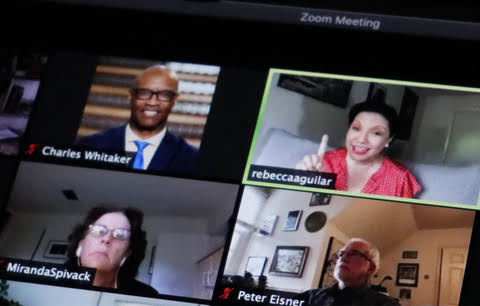
Rebecca Aguilar was toasted on becoming president-elect of the Society of Professional Journalists, the first Latina and woman of color in that role, along with Ivette Davila-Richards, who was elected secretary-treasurer.
Of the nine-member SPJ board, four are people of color, Aguilar noted “That says a lot. . . . SPJ is sending a clear message, that we’re not just going to talk the talk; we’re going to walk the walk.”
Sims, who has worked at The New York Times, the Ford Foundation and International House, said, “I’ve been wanting to return to journalism for some time, and I can’t think of a more momentous time to be doing it than right now.”
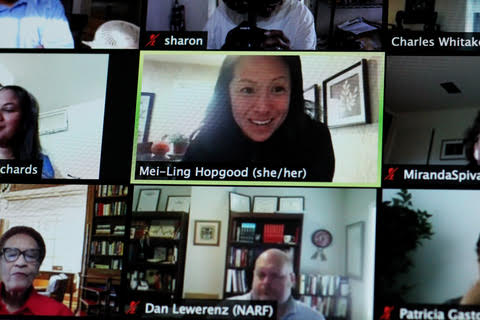
Hopgood, responding to a question, found it “pretty amazing that enrollment in journalism schools [is] up despite the turbulence, and I think you know that these young people are just inspirational in t]hat they really do want to make a difference, and they still believe that journalism can still be a vehicle for that.”
Hopgood also said, “They come from a different spot where they have different expectations of diversity, equity and inclusion work. They come in, many of them, not all, with a different formation of how the world should work and how it should treat people. . . . They have higher expectations of our industry.”
- Acee Agoyo, indianz.com: ‘Trump is hitting us really hard’: Biden campaign confronts last minute push for Native vote
- Jon Allsop and Pete Vernon, Columbia Journalism Review: How the press covered the last four years of Trump
- Gustavo Arellano, Los Angeles Times: Trump inspired them to become U.S. citizens and to vote. Against him
- Cecilia Ballí, Texas Monthly: Don’t Call Texas’s Latino Voters the “Sleeping Giant”
- Monika Bauerlein and Clara Jeffery, Mother Jones: Facebook Manipulated the News You See to Appease Republicans, Insiders Say
- Kelsey Carolan, Texas Tribune: In Democrats’ bid to flip Texas, maximizing the Latino vote is key
- Jelani Cobb, “Frontline,” PBS: “Whose Vote Counts” (video) (Oct. 20)
- The Crisis, NAACP: Voting Supplement
- Nick Fouriezos, Ozy: Dem Fear in Ohio: Repeat of 2016 Blunder With Black Voters
- Renée Graham, Boston Globe: Voter suppression is democracy bleeding out (Oct. 13)
- Earl Ofari Hutchinson, the Hutchinson Report: The Electoral College How it Works (video)
- Mathew Ingram, Columbia Journalism Review: Yes, we’re doing it all over again (Oct. 15)
- Morgan Lee, Associated Press: Watchdog group cites interference at polls in Latino areas
- Sophie Long, BBC: US Election 2020: Why Arizona matters so much to Trump and Biden (Oct. 13)
- Alex Samuels, Texas Tribune: Why Asian American voters in Texas may hold outsized importance in key races this year
- Calah Schlabach, Cronkite News: Court: Mailed Navajo ballots should not get extra time to be counted (Oct. 15)
- Nina Shapiro, Seattle Times: Among Vietnamese American voters, the Trump-Biden presidential race inflames old wounds (Oct. 17, updated Oct. 19)
- Marlow Stern, Daily Beast: Jeff Zucker on the Big ‘Mistake’ CNN Made Covering Trump and His Regret Over Hillary’s Emails (Oct 14, updated Oct. 15)
- Rudy Takala, Mediaite: NBC News Predicts Texas Moving Toward Biden
- Chris Uggen, Ryan Larson, Sarah Shannon, and Arleth Pulido-Nava, The Sentencing Project: Locked Out 2020: Estimates of People Denied Voting Rights Due to a Felony Conviction (Oct. 14)
To subscribe at no cost, please send an email to journal-isms-subscribe@yahoogroups.com and say who you are.
Facebook users: “Like” “Richard Prince’s Journal-isms” on Facebook.
Follow Richard Prince on Twitter @princeeditor
Richard Prince’s Journal-isms originates from Washington. It began in print before most of us knew what the internet was, and it would like to be referred to as a “column.” Any views expressed in the column are those of the person or organization quoted and not those of any other entity. Send tips, comments and concerns to Richard Prince at journal-isms-owner@yahoogroups.com
View previous columns (after Feb. 13, 2016).
- Diversity’s Greatest Hits, 2018 (Jan. 4, 2019)
- Book Notes: Is Taking a Knee Really All That? (Dec. 20, 2018)
- Book Notes: Challenging ’45’ and Proudly Telling the Story (Dec. 18, 2018)
- Book Notes: Get Down With the Legends! (Dec. 11, 2018)
- Journalist Richard Prince w/Joe Madison (Sirius XM, April 18, 2018) (podcast)
- Richard Prince (journalist) (Wikipedia entry)
- February 2018 Podcast: Richard “Dick” Prince on the need for newsroom diversity (Gabriel Greschler, Student Press Law Center, Feb. 26, 2018)
- Diversity’s Greatest Hits, 2017 — Where Will They Take Us in the Year Ahead?
- Book Notes: Best Sellers, Uncovered Treasures, Overlooked History (Dec. 19, 2017)
- An advocate for diversity in the media is still pressing for representation, (Courtland Milloy, Washington Post, Nov. 28, 2017)
- Morgan Global Journalism Review: Journal-isms Journeys On (Aug. 31, 2017)
- Diversity’s Greatest Hits, 2016
- Book Notes: 16 Writers Dish About ‘Chelle,’ the First Lady
- Book Notes: From Coretta to Barack, and in Search of the Godfather
- Journal-isms’ Richard Prince Wants Your Ideas (FishbowlDC, Feb. 26, 2016)
- “JOURNAL-ISMS” IS LATEST TO BEAR BRUNT OF INDUSTRY’S ECONOMIC WOES (Feb. 19, 2016)
- Richard Prince with Charlayne Hunter-Gault,“PBS NewsHour,” “What stagnant diversity means for America’s newsrooms” (Dec. 15, 2015)
- Book Notes: Journalists Follow Their Passions
- Book Notes: Journalists Who Rocked Their World
- Book Notes: Hands Up! Read This!
- Book Notes: New Cosby Bio Looks Like a Best-Seller
- Journo-diversity advocate turns attention to Ezra Klein project (Erik Wemple, Washington Post, March 5, 2014)
.

